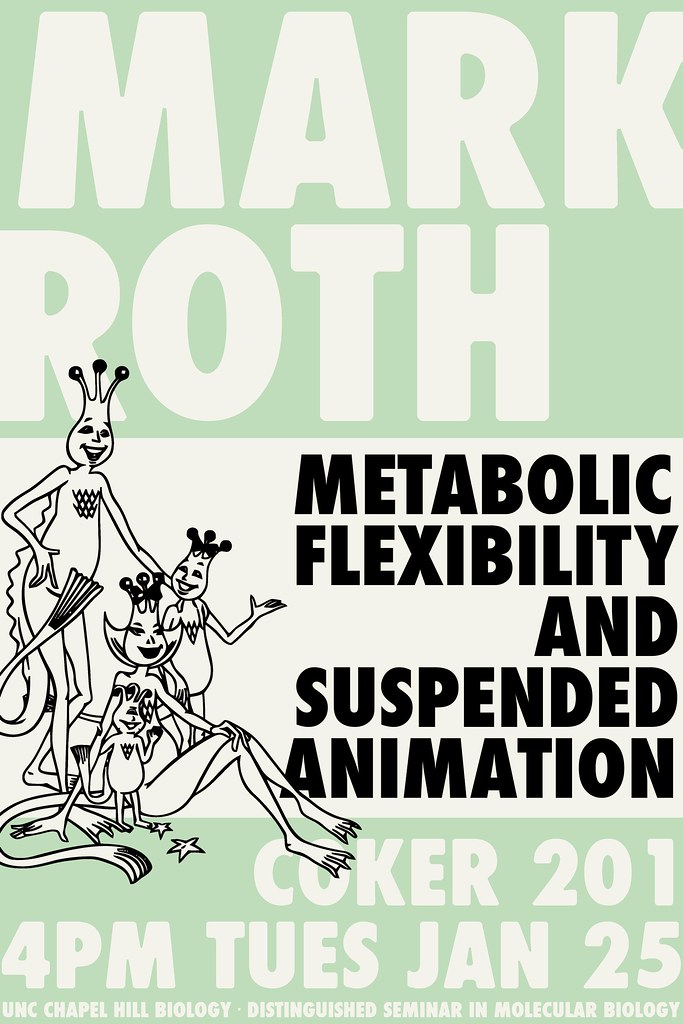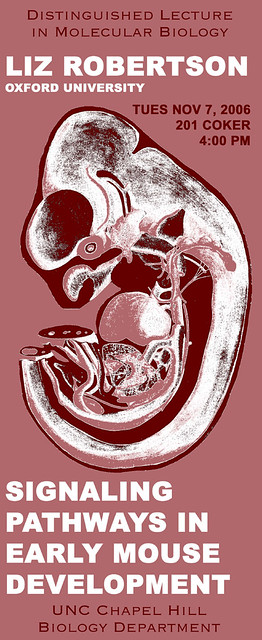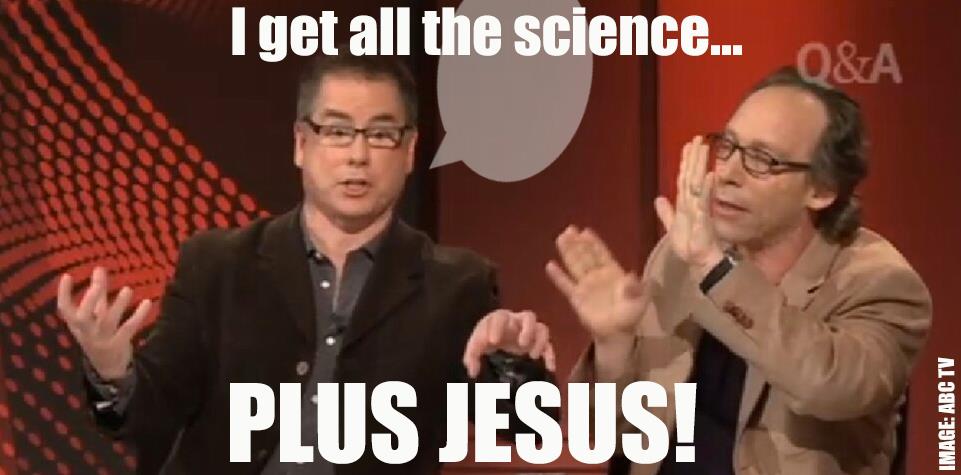“In our age I think it would be fair to say that the ease with which a scientific theory assumes the dignity and rigidity of fact varies inversely with the individual’s scientific education. In discussion with wholly uneducated audiences I have sometimes found matter which real scientists would regard as highly speculative more firmly believed than many things within our real knowledge; the popular imago of the Cave Man ranked as hard fact, and the life of Caesar or Napoleon as doubtful rumour. We must not, however, hastily assume that the situation was quite the same in the Middle Ages. The mass media which have in our time created a popular scientism, a caricature of the true sciences, did not then exist. The ignorant were more aware of their ignorance then than now” — CS Lewis, The Discarded Image
Tag: science
SNIPPET // CS Lewis on science, truth, and knowledge
The science of deconversion
From one man he made all the nations, that they should inhabit the whole earth; and he marked out their appointed times in history and the boundaries of their lands. God did this so that they would seek him and perhaps reach out for him and find him, though he is not far from any one of us.
// Acts 17:26-27
I’ve read a few stories from ex-Christians this week. Prompted, in part, by the story of Ryan Bell, a former Seventh Day Adventist pastor who, when he left the ministry, decided to try to live for a year without God.
As an experiment.
Unsurprisingly, the experiment of not seeking God, or wilfully ignoring God, resulted in God not being found.
One of the common things I’ve experienced as I’ve read these stories — apart from the sadness that comes from reading someone’s account of what essentially amounts to ending one’s own life, spiritually — is the sense that when people deliberately choose to stop seeking God, they shouldn’t be surprised when they no longer find him.
Here’s NPR’s version of Ryan Bell’s story: A pastor goes for a year without God, and gives up on God altogether.
After a year without God, Bell decided he didn’t need God to explain his experience of the world, any longer, and he pulled out a line that has come up in a few of these articles that I’ve read— the idea that science and God are in conflict.
There are plenty of good reasons not to believe in the God of the Bible. This is not one of them.
If you choose to approach belief in God as a hypothesis to test, and you start with the assumption that God isn’t there, rather than being open to the possibility that he is, then no matter what evidence you’re confronted with — the classic stuff like the magnificent beauty and complexity of the world, the profound and intricate quality of the Gospel story, beginning with the creation of the world, the amazing changes wrought in the lives of people who take up this story and live as part of it (which have a fascinating interplay with what we’re learning about the plasticity of the brain — such that these changes are demonstrable and real) — no matter what evidence there is, it is all able to be explained without God, if one assumes God is not there. It’s all so very natural. But this is because, I think, what is natural is natural because it is made by God.
This makes the whole attempt to prove, or disprove, God from the natural a little bit moot. Understanding nature doesn’t do away with a supernatural agent who established nature.
I haven’t read many accounts of deconversion that grapple with this concept. Or with the sense that plenty of unnatural stuff has been introduced into this world (and accounted for in the Christian story) — in the form of evil, sin, and death.
If you have this sort of framework (as presented by the Bible) — where God doesn’t act outside of nature, but rather defines it, and, where nature, as we experience and observe it, has been damaged by sin —then it’s hard for me to see how you can use nature, or science, as an argument for or against God.
If you are deliberately not looking for God, you should possibly expect to not find him (unless you’re a bit like Jonah, or you’re prepared to acknowledge that a certain longing for something that we try to satisfy with all sorts of things God has made is possibly a result of us being hard-wired to worship— in which case I’d read David Foster Wallace’s This Is Water, and some CS Lewis).
Here are Bell’s words from the NPR story…
“I think one of the things I’ve learned is that people very much value certainty and knowing and are uncomfortable saying that they don’t know. I find that scientists, by occupational tradition, I suppose, are more comfortable saying they don’t know. That’s kind of the impetus to keep searching. Atheists, I think, are comfortable with saying they don’t know. I find Christians are very uncomfortable saying they don’t know. I think on all sides of this question, certainty is a little overrated.”
I am very comfortable saying “I don’t know” about just about anything. But that doesn’t mean I don’t try to know stuff, or that I don’t operate as though the things I think I know are true.
This idea is expanded a little more on Ryan Bell’s own website, where he explains his decision…
“While science has yet to answer every question about our existence and our place in the universe, it has gone a remarkable way toward that end. I expect there will always be mysteries waiting to be investigated, but the scientific method has served us well. Coming as I have from a Christian tradition that flatly refuses to acknowledge the discoveries of science, my faith has limited my understanding of the world and my pursuit of truth. I cannot live in this way any longer. I feel much more confident leaving questions of our physical world and the cosmos to science. I understand that some Christians can reconcile their faith with the scientific account of our origins, but I see no reason for this approach at this time.”
Repeat after me. Science and God are not in conflict.
SCIENCE AND GOD ARE NOT IN CONFLICT.
Some scientists are in conflict with God, some Christians are in conflict with scientists, some Christians are in conflict with God, and some Christians are in conflict with science. But it’s a category error to suggest that understanding the way the world works, in any way, does any damage to God.
Some Christians and some atheists seem to want science and God to be in conflict in order to fit in with different, pre-conceived, narratives about life, the universe, and everything.
I find, often, with deconversion stories like this, the people involved are giving up on a God of their own construction (or the construction of their own strand of religious belief). When I read stories like Bell’s I encounter pictures of a God absolutely not worth persevering with, and a God completely unlike the God who both drew near and revealed himself in the person of Jesus Christ, through his life, death and resurrection. The God who revealed himself in the very human, but utterly divine, story of redemption unfurled in the pages of the Bible. The God who created all things, wondrously, and gives all things meaning, and being, and life, within (rather than external from) himself. The God at the heart of deconversion stories like this is smaller, more detached, less relevant, and more capricious than the God I believe in on the basis of these actions.
I also don’t get— picking up on another thread from Bell’s quotes, ignored from here on— how any Christians can operate without doubt, or while thinking doubt is a problem. The weird outcry after the Archbishop of Canterbury, Justin Welsby, admitted he doubts sometimes, blew my mind. The idea that healthy, growing, living, faith can exist without doubt is completely beyond my experience, and my observations of others.
What Bell, and others, are responding to, I think, is a strange dogmatism within the church that wants science to operate as natural revelation on our own personal terms, without paying heed to the different persuasive agendas at the heart of natural revelation and Biblical revelation.
If the Bible is to guide our approach to science and the natural world— then we need to consider what it says nature reveals, and what it claims it (the Bible) reveals.
What science reveals
I love the notion of the universe being God’s second book of Revelation, from Augustine, and others. When we understand the amazing complexity and beauty of the world we are meant to be confronted with the character of God, and I think what God reveals about himself in the Bible, and ultimately in Jesus, should be in harmony with the picture of God we get when we look at a cell through a microscope, or the Goldilocks Principle, but I don’t think we can ram scientific findings through pre-conceived modern interpretations of ancient texts in a bid to synthesis the two as though they speak to us in exactly the same language. These ancient texts that were written before the Scientific Method was invented. The biggest claim the Bible makes about the function of creation-as-revelation is that it should cause us to seek after a creator, and it should reveal the folly of turning created things into objects of worship. That’s Paul’s argument in Romans…
“The wrath of God is being revealed from heaven against all the godlessness and wickedness of people, who suppress the truth by their wickedness, since what may be known about God is plain to them, because God has made it plain to them. For since the creation of the world God’s invisible qualities—his eternal power and divine nature—have been clearly seen, being understood from what has been made, so that people are without excuse.
For although they knew God, they neither glorified him as God nor gave thanks to him, but their thinking became futile and their foolish hearts were darkened. Although they claimed to be wise, they became fools and exchanged the glory of the immortal God for images made to look like a mortal human being and birds and animals and reptiles.
// Romans 1:18-22
If creation-as-revelation has an in built persuasive (or revelatory) agenda it is this — it suggests a creator and shows something of his nature — so we can infer, from our observations of creation that there appears to be natural order and laws that we can tap into in order to operate in the world (stuff like gravity), that there appears to be natural beauty that we are hardwired to appreciate with our senses, and that material things, and even animals, are beautiful and good, but obviously limited, and within our capacity to control, so not worthy of being turned into our gods. The more we know about the material things of this world and how they work the less reason there is for superstition attached to objects — which is why science is a good reason not to believe in rain gods, or worship statues that we have carved, but not a great reason to reject a creator God who gives being to every thing in the universe. I’ll suggest below that perhaps the more significant revelatory function for the world is as the stage in which God operates in his interactions with humanity.
Paul says this knowledge of God from creation is enough for us to earn judgment if we reject God and worship created stuff, but it’s clear from his argument in the rest of Romans that this picture of God is not enough. That we need God to be specifically revealed, in the person of Jesus, to get out of this mess.
Science is great. Science helps us get a sense of scale. It helps us understand the very small space we occupy in a very large and complex universe.
Here’s how Calvin explained the relationship between what science reveals, and what the Bible reveals, in his Commentary on Genesis.
“I have said, that Moses does not here subtly descant, as a philosopher, on the secrets of nature, as may be seen in these words. First, he assigns a place in the expanse of heaven to the planets and stars; but astronomers make a distinction of spheres, and, at the same time, teach that the fixed stars have their proper place in the firmament. Moses makes two great luminaries; but astronomers prove, by conclusive reasons that the star of Saturn, which on account of its great distance, appears the least of all, is greater than the moon. Here lies the difference; Moses wrote in a popular style things which without instruction, all ordinary persons, endued with common sense, are able to understand; but astronomers investigate with great labor whatever the sagacity of the human mind can comprehend.”
The natural limits of science
Science is the description, and attempt to describe, material realities. It’s fantastic at dealing with the material, natural, world, and completely unequipped to deal with the supernatural.
Science can’t test God, and certainly not the God described by the Bible. Or the creator God conceived by the predominant monotheistic religions.
If God exists — certainly the God of the Bible — then science won’t find God, to prove or disprove him. The material realities measured and observed by science occur within the natural universe, which occurs within this God’s power.
Describing how things happen does not do away with God, nor is God an explanation for where we can’t describe how things work (except that ‘God did it’ is a suitable description of every material thing). There are no gaps for God to be the God of – because God is God of everything. There are gaps in our understanding of the way God did things and the way things work. There probably always will be. God is limitless, his universe is, in comparison to tiny us, in our tiny corner of the galaxy, essentially boundless.
Creation — the universe in its entirity — doesn’t encompass God. God encompasses the universe.
“In his hand is the life of every creature and the breath of all mankind.”
Job 12:10
The God who made the world and everything in it is the Lord of heaven and earth and does not live in temples built by human hands. And he is not served by human hands, as if he needed anything. Rather, he himself gives everyone life and breath and everything else.
Acts 17:24-25
The Son is the radiance of God’s glory and the exact representation of his being, sustaining all things by his powerful word.
Hebrews 1:3
“The Son is the image of the invisible God, the firstborn over all creation. For in him all things were created: things in heaven and on earth, visible and invisible, whether thrones or powers or rulers or authorities; all things have been created through him and for him.”
Colossians 1:15-16
This is the God of the Bible’s relationship to the world.
When we’re observing life, and matter, and mechanics — doing science — coming to terms with how the world operates, we are observing the workings of this God. The only way science has any bearing on the question of God is when it comes to things God has revealed about his character, or his world, being irreconcilable with scientific discoveries. And science itself is always on the lookout for a better, more elegant and accurate, explanation of how things work. The great strength of science is that it doesn’t get set in its ways. So to rule out God on the basis of a current scientific consensus about something is a pretty dangerous business, especially if God is all the things the Bible claims he is.
Science will describe things that were either made by God, or not made by God (if he doesn’t exist). Science gets things right, it gets things wrong. It changes over time as our understanding of things grows.
If science and the Bible are asking two very different sets of questions — and answering these questions — how can we possibly set them up in opposition to each other?
What the Bible Reveals
The scientific method is asking very different questions of the world, and providing different insights into the nature of God than the Bible (though these insights will be consistent, and I personally tend to read insights about God from the Bible into how I understand the world as revealed by science). The Bible is all, from cover to cover, about the redemption of God’s universe through the life, death, resurrection, and reign of Jesus Christ. This story also reveals the character of God— his eternal power, and divine nature.
This is what Jesus claims about the Old Testament, in Luke 24, where he’s teaching a couple of people about himself after his resurrection…
“And beginning with Moses and all the Prophets, he explained to them what was said in all the Scriptures concerning himself.”
Then, later, in the same chapter… when he appears to his disciples, we get a sense of what this explanation included.
“He said to them, “This is what I told you while I was still with you: Everything must be fulfilled that is written about me in the Law of Moses, the Prophets and the Psalms.”
Then he opened their minds so they could understand the Scriptures. He told them,“This is what is written: The Messiah will suffer and rise from the dead on the third day, and repentance for the forgiveness of sins will be preached in his name to all nations, beginning at Jerusalem.”
This is what Jesus thinks the Bible is all about. So that’s good enough for me… I’m not sure we can use science to test any of that story— beyond the scientifically vigourous exploration Thomas is reported as conducting on the resurrected Jesus (again, before the invention of the Scientific Method).
I’m not sure how science poses any sort of threat to this story. It might cause us to question some of the mechanics of the story, and when that happens we’re left with questions about the relationship between God’s two books, and which takes priority when interpreting the other (so this is where I think debates about Evolution sit), but those questions aren’t really questions that have any bearing on the life, death, and resurrection of Jesus. Which are historical questions. And not the reasons given for deconversion by Ryan Bell, or others I’ve read this week.
The Bible exists to tell this story, and to persuade us that Jesus is God’s promised king.
The natural— created— universe is the setting for this drama. The natural world is the stage upon which God writes his story, and even enters the story, at its climactic moment.
Both the world and the Bible have God’s DNA pulsing through them because he is the author of both books. There is a consistency created by this shared DNA. We look at both the world, and the story, and see evidence of design, of beauty, of stirring complexity. If we take what the Bible says about God’s plans, from the very beginning, involving the crucifixion of Jesus as true — if it was God’s plan when he made the world — then it’s almost impossible for us to get our heads around how many threads were being woven together in order to present the rich tapestry of the crucifixion, where Jesus enters the story and is crucified. It’s hard to fathom just how many human lives were being orchestrated to tell this story over so many thousands of years such that, for example, being hung on a tree was understood as a marker of being cursed for the Jewish audience, and crucifixion (being nailed to a tree) was a punishment for people who claimed to be kings within the Roman empire.
Like a good movie director makes sure the setting of the story helps the characters enact the story, God established the world in a way that helps the story of Jesus stand out in vivid colours. But if we assessed the story – and the question of God’s existence – purely on natural questions we’re missing the big picture. We’d be like movie watchers who ignored the story and focused on the set design, not just the design, but the materials used. They’re interesting questions, especially for actors in the production who want to know if different parts of the set will bear their weight or be suitable for their own purposes — but they’re not the main question. They’re great questions for us to ask, and asking them will give us a greater appreciation of the director when we get a sense of the quality of construction and materials selected — and they’ll be profoundly useful for us as we live, but they’re not going to point us to Jesus. Which the Bible does. Profoundly.
The Bible is great, like science it helps us see our place in the very large universe, and our place in the heart of God, we are so tiny, our life spans are so small in the scheme of eternity, and yet, God entered this planet, this relatively tiny planet, as a human, in the backwaters of an Imperial outpost, he became lower than the lowest human, in the manner of his death, and he died, out of love for humanity, putting those who follow him at the heart of the universe.
That’s what is at stake in deconversion based on science — an existential question — are you a fleeting speck in the scheme of eternity, or did the God who made the universe in its entirety give up his life for you? I know which story I prefer. I know which story meshes better with a view of the world that radiates majestic beauty, and intricate, integrated, complicated order.
I see no reason not to approach the world through this framework at this time.
John Dickson on #qanda
I’m thankful Australian Christianity has spokespeople who don’t play the stupid combative game that Q&A seems to thrive on. John Dickson continued in Peter Jensen’s fine tradition (not Pell’s so much, thankfully).
Image Credit: Australian Christian News
I really appreciated his willingness to charitably cede points, and agree with others on the panel in order to make the most important point, and to push on despite being interrupted to get his key message across. This is a paraphrase, I only started typing what he was saying about halfway through… but I thought this bit was the highlight. The transcript is now available, and I’ve included some other highlights below.
“you’ve got to ask yourself the question: is there any evidence on the world stage that this God we think is maybe just a mind has touched the earth in a tangible way? And for me, if you are asking me why do I think there’s a God, it’s this philosophy of science, plus the life of Jesus.”
There were some great #qanda tweets on screen tonight too that indicated Dickson’s approach, and the substance of his answers, was appreciated by the non-Christians in the audience.
I’m sure others are going to be more or less excited about his treatment of science – but historically, there’s little doubt that science arose on the back of a Christian desire to know more about God’s creation, so there is something nice about not tossing science under the bus while acknowledging that it is a movable feast – a point Krauss made very strongly over and over again – science isn’t set in stone, it’s an ongoing discussion of the evidence, and what Dickson demonstrated is that a robust Christian faith has nothing to fear from science – because it’s all about Jesus, and understanding how the Bible relates to the God who created the world reaching out to touch it in the person, death, and resurrection of Jesus.
It’s worth pointing out that while Dickson accepted a truckload of science that some Christians might be unhappy with – including stuff about the age of the earth and evolution – he wasn’t asked about the historicity of Adam, which is where a lot of the theological weight in the debate rests – he also didn’t say anything disputable about the content of Genesis 1-2, what might be in dispute is what to do with his genre observations… and being honest about the history, intentions, usefulness, and limitations of science while being clear about who Jesus is, in a program that was trending worldwide on Twitter, is, I think, a win. The program format limits the panelists’ ability to come back and clarify or expand on the points they make – so while I’ve read a bunch of people throwing rocks at Dickson, on Twitter, in the comments here, etc – I think you’ve got to take the format into account.
Here were some bits from Dickson that I thought were just stellar…
“I agree with almost everything Lawrence just said actually except I would beg to differ about whether science can actually produce an ethic. I think human beings produce an ethic and we decide whether to use science positively or negatively according to our world view and history is littered with examples of science being used brilliantly, ethically so, and times when it’s used badly. I disagree that science has any ethical import. It’s a neutral discipline and it’s a wonderful discipline. The little quips that I heard throughout about science is all about humility and so on I love. In fact Peter Harrison of Oxford University, who is one of the world’s leading historians of science, thinks that it was a revolution in this doctrine of humility that flourished in the 14th and 15th centuries that got science going in Europe in part. It’s not a total explanation but that as Augustine philosophy developed, which basically said human beings are flawed so we need better techniques. We can’t trust our brains. We need to observe, and this Augustinian philosophy grew out of Christianity, as you know, and so Christianity probably is, in part, responsible for science in the first place. I agree that it shouldn’t stick its head in now and tell the scientists what to do. My view is let the scientists do the science. My view is let the scientists do the science and let religious believers do what they do.”
This bit (Family First can learn from this one)…
“The only thing I want to pick up Lawrence with is to say to call it child abuse, to me there are two problems with this. One, it so inflames the conversation and I think the new atheism breeds of this kind of inflamed kind of conversation. The second thing I find very uncomfortable about it is that anyone in the audience who has actually been abused finds that a very odd use of that very loaded term. I know you don’t mean it like that but it’s like someone saying “Oh, that’s a holocaust”. There is one holocaust.”
This was the absolute gold.
JOHN DICKSON: “We live in a universe that operates according to these elegant, beautiful laws and when I read your book this week I was more convinced that that’s the case. And this universe, operating according to these elegant laws, has produced minds that now understand the laws, especially this mind next to us. And so this, to me, all looks and this is not a proof for God but I’m just saying why a lot of people think the God thing has a lot going for it, the whole thing looks rational. The whole thing looks set up to be known. Now, only known in a rational, like the God of Einstein, so then you’ve got to ask yourself the question: is there any evidence on the world stage that this God we think is maybe just a mind has touched the earth in a tangible way? And for me, if you are asking me why do I think there’s a God, it’s this philosophy of science, plus the life of Jesus.
LAWRENCE KRAUSS: Well, yeah, but hold on. There was a bait and switch there that I object to and that was that…
JOHN DICKSON: Can I get to the end of the bait?
LAWRENCE KRAUSS: Well, you said Jesus and then you started going off and we were no longer – okay.
JOHN DICKSON: So what I’m saying is you ask yourself the question: is there any tangible thing in the history of the world that looks like contact from the God we suspect might be there? The overwhelming – I think overwhelming evidence points in the direction of Jesus, his life, his teaching and his healings, his death and resurrection. And when I come to believe that, this opens up the world to me. It is like CS Lewis saying “I believe in Christianity for the same reason I believe in the sun, not because I can look at it but because by it I see everything”. And, for me, Christianity explains the world I live in in such a spooky and deep way that I find I feel I have met the God I had a hunch was there based only on the beautiful elegant (indistinct)…
TONY JONES: Okay. All right. So now we’ve moved into the – I was going to say I would like Lawrence to respond to that. We have moved into the area of intuition now and perhaps…
JOHN DICKSON: And history.”
I barely watch Q&A anymore – five panelists is far too many. Tonight would have been sensational had it just been Krauss and Dickson, the others (as much as I like Tanya Plibersek) added nothing to the discussion, and there were too many times where misunderstandings were glossed over and not resolved in order for the pollies to get their bits about climate change in.
Did you catch it? What’d you think?
Liquid Nitrogen meets 1,500 table tennis balls: this is science
I skipped to the punchline here (3:45) so I have no idea if the rest is worth watching. But this is cool…
Awesome mad scientist makes Tesla Gun
I kid you not. According to the interwebs. This guy’s name is Flickenger. His life as an awesome physics defying mad scientist was nominally determined. Here’s how he did it. But seriously. Don’t try this at home. Unless you’re happy to make two.


And look. Video.
Lego Hadron Collider: if you step on the “God particle” it hurts…
A 1:50 scale model of the Large Hadron Collider’s Atlas Detector. In Legos. Yes.


Some fun facts – the guy behind it wanted Lego to embrace the project, producing it as a kit…
“The raw materials required to the build the LHC model cost about EUR 2,000, funded by the high energy physics group to promote alternative ways of learning.
The company that builds lego bricks (trademarked in capitals as LEGO) has so far not reacted to Professor Mehlhase’s proposal to build the model.”
Aww.
Perhaps this is why:
“The model is made of 9,500 lego bricks and is about 1:50 in scale. There is no construction manual yet, but there will soon be one, he says on his website. The model is very intricate, even showing the innermost pixel detector.”
There’s a gallery of construction pictures and stuff here.
It was created by the University of Copenhagen, Via thenextweb
Just what the doctor ordered: Scientifically accurate fabric brain art
Yes. This is a thing that exists. Thanks to the Museum of Scientifically Accurate Fabric Brain Art, no less. There’s even a wooden counterpart.



If that’s not your cup of tea – how about some mathematically accurate knitting? For example: a double-knitted Möbius-band-into-torus…
Minute Physics: Get in touch with your inner geek…
These are cool.
H/T to Kutz, who shared this pink light one a while ago.
Clear cut biology: Amazing transparent animal specimens
These are cool. A Japanese designer/scientist is turning science into art with these transparent animal skeletons. They are amazing.
Here’s a little synopsis of his project. The site is in Japanese, but the magic of google translate should fix that for you.
“Originally, the method of making transparent specimens – enzymatically turning the protein transparent, dyeing the bones magenta and dyeing the cartilages blue – was established for scientific purposes to study the skeletal system. Taking this a step further to refine the form and coloration of the specimens requires time and experience.
I create transparent specimens as pieces of work that help people feel closer to the wonders of life.
People may look at my specimens as an academic material, a piece of art, or even an entrance to philosophy. There is no limitation to how you interpret their meaning. I hope you will find my work as a “lens” to project a new image, a new world that you’ve never seen before.”
Here’s some of his work.
Look Around You: Weird Retro Science Videos
These are crazy. Some details about the “Look Around You” TV show here.
The aesthetic is almost perfect.
Two wikipedia articles that simultaneously restore and diminish my hope for humanity
Now, Wikipedia didn’t think Jeremy Wales was suitable subject matter for an article, but they do think that Fart Lighting and Goldfish Swallowing deserve entries. I’m not sure what Jeremy should think about this. He is less newsworthy than flammable flatulence. Though perhaps the problem with my article about him was that it was somewhat embellished.
In case you’re wondering:
Fart Lighting
Fart lighting, or pyroflatulence, is the practice of igniting the gases produced by human flatulence, often producing a flame of a blue hue. The fact that flatus is flammable, and the actual combustion of it through this practice, gives rise to much humourous derivation. Other colors of flame such as orange and yellow are possible with the color dependent on the mixture of gases formed in the colon.
Although there is little scientific discourse on the combustive properties of flatus, there are many anecdotal accounts of flatus ignition and the activity has increasingly found its way into popular culture with references in comic routines, movies, and television; including cartoons.
You can read more about the science involved at the BBC.
Goldfish Swallowing
Goldfish swallowing was an American school fad starting in the 1930s, where a live goldfish is swallowed.
It is not clear how it became a fad: various people have made claims. A 1963 letter to the New York Times claimed that the fad began in late 1938 when Lothrop Withington Jr., a Harvard freshman with “[class] presidential aspirations,” was encouraged by his “campaign managers” to do so as a publicity stunt: “Reporters and photographers were inadvertently present in the Harvard Freshman Union when Withington swallowed his live goldfish (with a mashed potato chaser) and started a nationwide fad in the spring of 1939.” The editor replied that “unless the Editor’s memory is deceiving him, the goldfish-swallowing craze among school and college boys had begun at least as early as 1930.”[1] However, a Time magazine noted in a 1939 article, “Harvard Freshman Lothrop Withington Jr., son of a onetime (1910) Harvard football captain, started the fad sweeping U. S. campuses…”
The limits of modern science and the notion of “best explanation”
Here’s a New Yorker article about the shortcomings of the scientific method. Basically it looks at the idea that heaps of scientific ideas are greatly exaggerated by early results without adequate testing and as experiments continue the results become less impressive.
“The test of replicability, as it’s known, is the foundation of modern research. Replicability is how the community enforces itself. It’s a safeguard for the creep of subjectivity. Most of the time, scientists know what results they want, and that can influence the results they get. The premise of replicability is that the scientific community can correct for these flaws…
“Once I realized that selective reporting is everywhere in science, I got quite depressed,” Palmer told me. “As a researcher, you’re always aware that there might be some nonrandom patterns, but I had no idea how widespread it is.” In a recent review article, Palmer summarized the impact of selective reporting on his field: “We cannot escape the troubling conclusion that some—perhaps many—cherished generalities are at best exaggerated in their biological significance and at worst a collective illusion nurtured by strong a-priori beliefs often repeated.”
Such anomalies demonstrate the slipperiness of empiricism. Although many scientific ideas generate conflicting results and suffer from falling effect sizes, they continue to get cited in the textbooks and drive standard medical practice. Why? Because these ideas seem true. Because they make sense. Because we can’t bear to let them go. And this is why the decline effect is so troubling. Not because it reveals the human fallibility of science, in which data are tweaked and beliefs shape perceptions.”
So what does this all mean. Obviously science has great explanatory power. And can largely be trusted, over time, to give us an improved understanding of the world we live in, and how it works. But we’ve got to keep remembering that science is a human tool used by stupid people and subject to mistakes, and external pressures like the need to publish in order to secure research funding. There’s a really interesting quote at the end of the article that dovetails nicely into this thread on the Friendly Atheist, where the problem with holus bolus acceptance of scientific naturalism is demonstrated once again (particularly see my question in the comments). Arguments to best explanation are great. And necessary. But we’ve got to keep a bit of epistemic humility and perspective and remember that one generation’s best explanation is the next generation’s $2 archaic science textbook on sale in the nostalgia section of the op shop.
“We like to pretend that our experiments define the truth for us. But that’s often not the case. Just because an idea is true doesn’t mean it can be proved. And just because an idea can be proved doesn’t mean it’s true. When the experiments are done, we still have to choose what to believe.”
Why you should work hard in science
Now I wish I hadn’t spent all of Chemistry at high school picking lines from random songs for my classmates to identify.
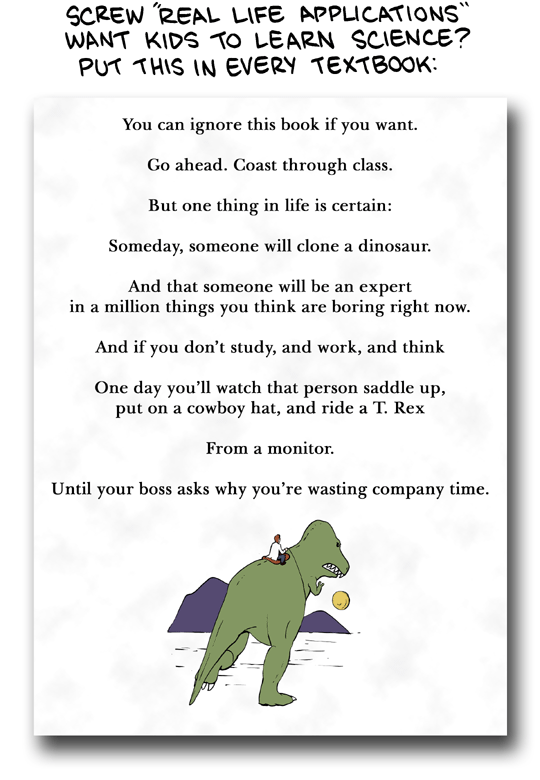
Oh well. The dinosaur cloners will need public relations people. I guess that’ll be my in.
From Saturday Morning Breakfast Cereal Comics, via the Friendly Atheist.
If Scientists were Rockstars
These minimalist rock star posters promoting scientific endeavour are cool (from etsy).
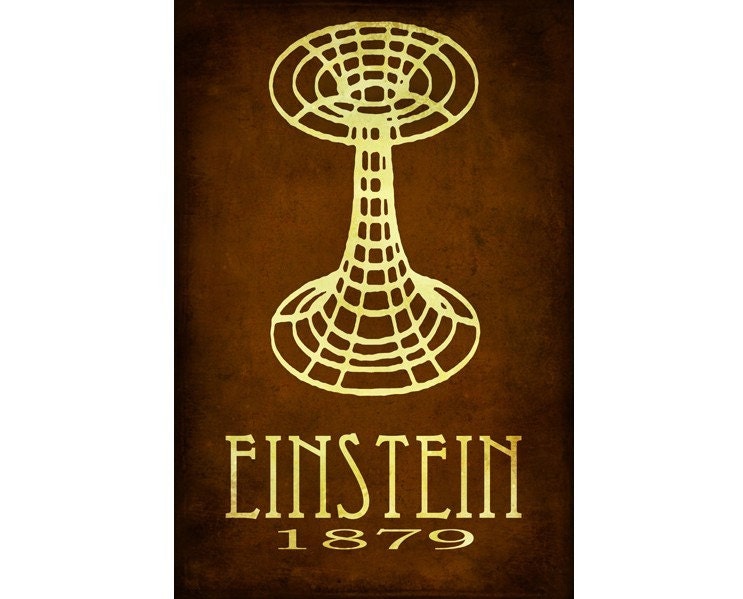


So too, these posters promoting scientific achievement as a rock gig. There’s a whole Flickr set of them.
